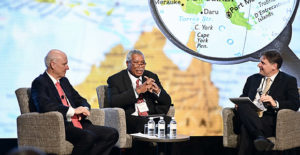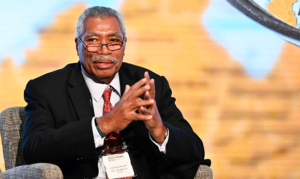Proposed changes to the Mining Act are likely to go to Papua New Guinea’s Cabinet ‘in the next few weeks,’ according to Peter Graham, Managing Director of Ok Tedi Mining and Chairman of state-owned Kumul Minerals Holdings. He told the 2019 Business Advantage Papua New Guinea Investment Conference that big changes are in the offing.
‘I think the State is feeling it is done with consultation because it has gone on for so long,’ said Graham.
‘There have been discussions since 2011 on the 1992 Mining Act. There is no question that some areas warrant updating. But there are also areas of considerable concern to investors today.
‘I think it is likely that the legislation will go to Cabinet in the next few weeks. Some of those things will represent pretty big changes to the industry. In the mining industry, it is at a fairly delicate stage.’
‘In the mid-2020s, once all the debt is paid off, there will be a new problem—a lot of revenue going to the state.’
Graham said that, ‘thankfully’, there is an agreement already in place for the Wafi-Golpu project, leading him to believe that it will be delivered under the existing legislative regime.
‘There is no reason to think it would not stay that way. But, for any new project coming in, they will be dealing with some more onerous requirements under the new Act.’
Balance

Ok Tedi Mining’s Peter Graham and Oil Search’s Gerea Aopi in discussion with Business Advantage International’s Andrew Wilkins at last week’s Business Advantage PNG Investment Conference in Sydney. Credit: BAI
After discussions with Prime Minister James Marape, Graham said that Marape’s comment on PNG’s government ‘taking back resources’ has been misinterpreted in some cases.
‘I think it is about getting the balance right. The discussions we had indicate it is really about getting a fair share of value, not necessarily taking back ownership of the resource.’
Graham commented that ‘one of the real challenges in PNG’ is that the government has sought to take significant equity holdings [buy shares] in big resources projects.
‘They borrowed extensively to achieve that and then have a huge tail of paying off that debt, with little money flowing to supposed beneficiaries.’ As a result, Graham explained, people get ‘quite dissatisfied’ and ask ‘What did we get out of this?’
The answer to that question is that the government owns 22 per cent of a ‘valuable asset’. ‘But it will take the government 10 years to pay off the debt and see something out of the equity ownership.’
Ok Tedi Mining’s Managing Director concluded that the debate is likely to focus on different ways of sharing value.
‘PNG respects contract sanctity; if they do a deal, they will stick to it.’
‘Ownership of equity is important, but it is a matter of degree. Is 20–30 per cent too much?
‘Would it be better to have a lower level of equity and less debt? And a higher royalty or export tax to capture some of that value from the resource? That is where the discussion will centre.’
Distributions
Gera Aopi, PNG Country Director at Oil Search Ltd and President of the PNG Chamber of Mines and Petroleum, told the conference that he believed the focus is more likely to be about the distribution of dividends.
‘What is the split? There will be issues in the first five or six years, when you are trying to repay your debt. You only get returns well after that.
Aopi pointed out that Kumul Petroleum received dividends in the same way that the other partners in the PNG LNG project received them.
‘In the mid-2020s, once all the debt is paid off, there will be a new problem—a lot of revenue going to the state.’
Certainty
Aopi said that, for international investors and the resources industry, certainty is critical.
‘We don’t object to the changes that take place, as long as there is proper consultation. People want certainty.
‘Investors coming in want to be certain that the fiscal and regulatory regime is stable.’
Graham agreed:
‘Certainty is an absolute. People are not going to put down billions of dollars with confidence unless they understand the fiscal and regulatory regime in which the project will operate.’
And he was confident that PNG will remain a good place to invest.
‘PNG respects contract sanctity; if they do a deal, they will stick to it. Historically, PNG has never messed with an investment once it has been in place.’









Speak Your Mind